7 Movies About Police Brutality & Systemic Racism Directed by Black Filmmakers
This is a list of seven films that explore police brutality and systemic racism made by Black filmmakers. These are important movies to watch and to take in, as — through the power of cinema — they showcase what it feels like to be a Black person living in a country that is internally designed to be against you.
Since George Floyd was murdered by police on May 25, 2020, we have seen protests erupt in all 50 states within the United States and 50 countries across the world on every continent except for Antarctica. The United States has sanctioned unchecked police brutality for far, far too long; a symptom of the systemic racism of a country that was built by slaves upon stolen land. Since May 25, the stories of murdered innocent Black people have been shared, as well as countless videos of the police brutalizing protestors at anti-police brutality protests.
There have been Black Lives Matter protests in the past. There have been riots, and officers have used tear gas and rubber bullets. What we are seeing on the news and in our neighborhoods is not new, but it has never been quite like this. Putting COVID concerns aside, people are taking to the streets to protest and raise awareness about the corruption of the police force in the United States, the inequality of the criminal justice system, and the systemic racism that is at this country’s heart.
For white people, this is a time to listen. We need to listen to Black people and hear their stories. We need to self-reflect and assess how our privilege has shielded us from much of the ugliness and terror that Black people experience daily. White people need to be vocal about their disdain for the actions of the police and the system of oppression within the United States. At the same time, we need to genuinely listen to other people and hear exactly how this country operates and functions differently for Black, Indigenous, People of Color than it does for white people.
I have always believed that movies can change the world; they hold the power to examine topics that many people are uncomfortable discussing. Movies can get the ball moving so that we have a starting point from which the conversation can begin.
This is a list of seven films that explore police brutality and systemic racism made by Black filmmakers. These are important movies to watch and to take in, as — through the power of cinema — they showcase what it feels like to be a Black person living in a country that is internally designed to be against you.
1 | Do the Right Thing (1989) | Directed by Spike Lee
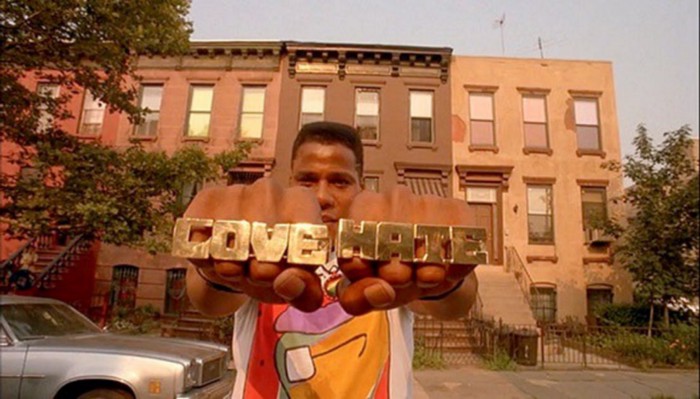
Starring: Spike Lee, Bill Nunn, Giancarlo Esposito
Genre: Drama, Comedy
Rating: R
Streaming: N/A
Premise: On the hottest day of the year on a street in the Bedford-Stuyvesant section of Brooklyn, everyone’s hate and bigotry smolders and builds until it explodes into violence.
Do the Right Thing looks at the escalating racial tensions within a Brooklyn neighborhood. The brilliance of this film is how it captures the mundanity of life in this neighborhood and, with that, the casual expression of racism by the white characters. It shows how Black people and other people of color experience racism every single day, so much so that it can become mundane.
Spike Lee orchestrates a film filled with witty back-and-forth and entertaining snapshots of people’s lives. He is a filmmaker who knows how to capture the levity within explorations of difficult subjects. The comedy never detracts from the severity of what is being addressed; rather, it is there to reinforce it and to help it be more palatable. This is a staple point of Spike Lee’s filmography, and it is something I respect about his approach to movies.
The film concludes with Radio Raheem (Bill Nunn) being murdered by the police. Mookie (Lee) subsequently throws a trash can through the window of the pizzeria he works for, and the place is destroyed out of collective anger and anguish. Just three years after the film’s release, the officers who were caught on camera severely beating Rodney King were found not guilty and riots ensued. Do the Right Thing is painfully relevant to what we’re seeing today, as Incluvie writer Andrew Stilson explores in an in-depth analysis.
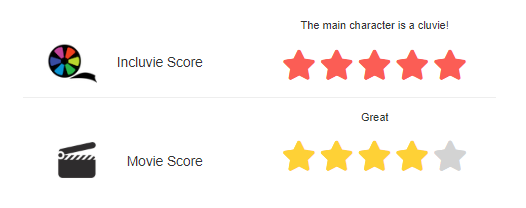
2 | Fruitvale Station (2013) | Directed by Ryan Coogler
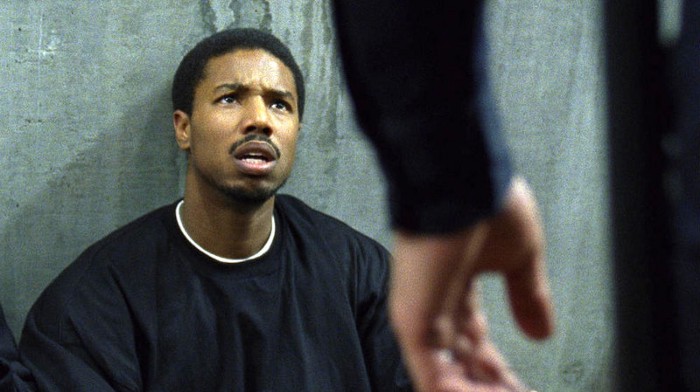
Starring: Michael B. Jordan, Meloni Diaz, Octavia Spencer
Genre: Drama
Rating: R
Streaming: N/A
Premise: The story of Oscar Grant III, a 22-year-old Bay Area resident, who crosses paths with friends, enemies, family, and strangers on the last day of 2008.
Fruitvale Station is one of the most heartbreaking movies about police brutality I have ever seen. While some of the movies on this list are focused more on other issues while touching on police brutality, Fruitvale Station is simply about the life of Oscar: a Black man who was murdered by the police. The film tells his story, detailing everything that led up to the fateful moment when Officer Caruso (Kevin Durand) decided to murder Oscar.
As Ryan Coogler’s (Creed, Black Panther) directorial debut, I think this is still his best film; it’s so raw and authentic, showing us the life of a man who loved and was loved; a man who left behind a family, including a young child, because a cop decided he was a threat and needed to die; a man whose only crime was celebrating New Year’s Eve.
The power of Fruitvale Station is that it shows how a regular, average thing done by a white person can become a death sentence for a Black person. It shows how someone who was just minding their own business and wasn’t a harm to anyone can still end up dead. Fruitvale Station is a sobering reminder of the injustice and lack of accountability that plagues the United States.
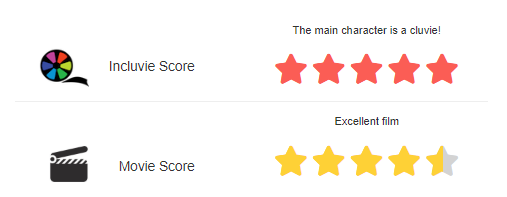
3 | Selma (2013)| Directed by Ava DuVernay
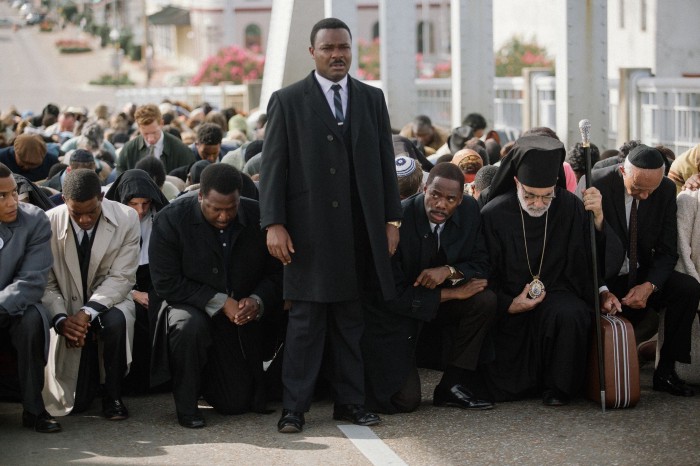
Starring: David Oyelowo, Carmen Ejogo, Oprah Winfrey
Genre: Drama
Rating: PG-13
Streaming: Streaming free for June
Premise: A chronicle of Dr. Martin Luther King, Jr.’s campaign to secure equal voting rights via an epic march from Selma to Montgomery, Alabama, in 1965.
Out of all the films on this list, Selma is probably the most inspiring movie. At times it will make your stomach churn, but at the end of the day, it’s a film about perseverance and hope. Selma is about standing up and doing the right thing even when all the odds are against you, even if the law says you’re wrong, even if other people say you’re wrong, even if your friends say you’re wrong; all that matters is that you know what is right and that you fight for that no matter what.
Martin Luther King, Jr. is one of the most influential people in history; he was truly admirable, and someone we should all look to as an example for protest and advocacy. Selma shows King’s power, his spirit, and his determination to fight for what is right. It shows the lengths people went to discredit him, to condemn him, and to ridicule him. Much of what was said to him and those marching with him are the same things being said today against the Black Lives Matter movement.
Selma is an important reminder of just how hard it is to bring about change. Throughout history, people have defended the status quo by saying, “this is just the way things are. Things are never going to change.” Time and time again, people like Martin Luther King, Jr. have pushed back on that mindset, and have brought about change. We may not be very far down the path to total equality, but movies such as Selma show us just how vital it is to keep fighting even when it feels hopeless.

4 | Straight Outta Compton (2015) | Directed by F. Gary Gray
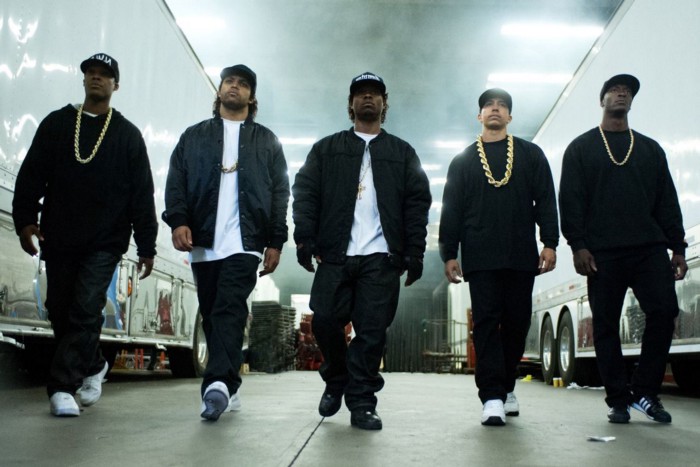
Starring: Corey Hawkins, O’Shea Jackson Jr., Jason Mitchell
Genre: Drama, Music Biopic
Rating: R
Streaming: N/A
Premise: The rap group N.W.A emerges from the mean streets of Compton in Los Angeles, California, in the mid-1980s and revolutionizes Hip Hop culture with their music and tales about life in the hood.
Straight Outta Compton is a very different film than the rest of the movies on this list. It is a musical biopic about N.W.A, and the story of how they rose to prominence and fame. However, it is also so deeply about police brutality. Growing up in Compton, these kids witnessed police brutality daily; they saw their family, their friends, their neighbors being beaten, tormented, and killed by the police. As they say in the film, “our art is a reflection of our reality.”
What they experience daily just because of their skin color shaped everything about the music they made, most chiefly “F**k Tha Police”. One of the most powerful parts of the movie is an encounter N.W.A has with the police when they are simply standing outside of their recording studio. They are taking a break from recording and talking with each other. The police pull up and force them all on the ground. Things are about to take a turn for the worse when their white manager Jerry (Paul Giamatti) comes outside and scolds the cops. This prompts Ice Cube (O’Shea Jackson Jr.) to write the song “F**k Tha Police.”
The best scene in the whole movie is when N.W.A is set to play a show in Detroit, and the police tell them before the show that they are not allowed to play “F**k Tha Police,” however, N.W.A ignores them and plays the song anyway. Undercover cops, as well as uniformed cops, storm the stage and arrest them. The power that comes from N.W.A standing up for their First Amendment rights and raging against a system that has oppressed them their entire lives — it’s truly remarkable to watch.

5 | I Am Not Your Negro (2016)| Directed by Raoul Peck
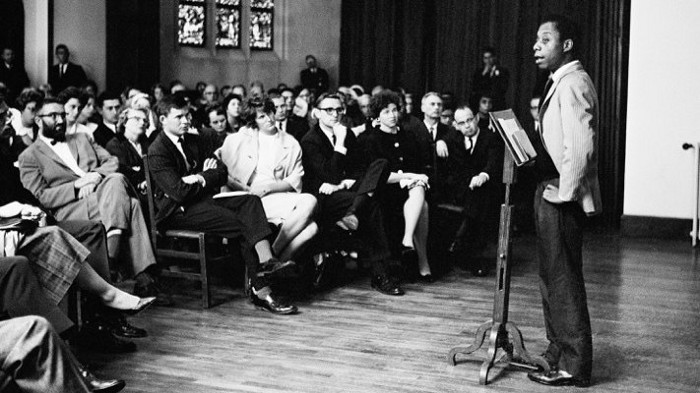
Starring: Samuel L. Jackson
Genre: Documentary
Rating: PG-13
Streaming: Amazon Prime
Premise: In 1979, James Baldwin wrote a letter to his literary agent describing his next project, Remember This House. The book was to be a revolutionary, personal account of the lives and assassinations of three of his close friends: Medgar Evers, Malcolm X, and Martin Luther King, Jr. At the time of Baldwin’s death in 1987, he left behind only 30 completed pages of this manuscript. Filmmaker Raoul Peck envisions the book James Baldwin never finished.
I Am Not Your Negro is one of the most innovative documentaries I have seen, because in many respects it’s not an actual documentary, rather, it’s an extension and completion of Baldwin’s writing using archival footage, movie clips, and voice over. Through this, it tells a very personal story about Baldwin’s thoughts and feelings on racial inequality in the United States.
Since it is not beholden to being a through-and-through documentary, it has the freedom to go places and do unique things. It spends a lot of time looking at how Black people have been portrayed in film history and comparing it to the realities of what was going on in the country at that time. Clips of Guess Who’s Coming to Dinner are juxtaposed with school integration footage.
Seeing the crowds of segregationists with their white power signs, seeing the protests and riots over integration, seeing an image of a Black woman lying on the ground with a cop pressing his knee into her neck — it shows that in many respects we have not changed that much. The words James Baldwin uses to describe the world he lives in are words that could just as easily be used today. That is the scariest and most horrifying part about it.

6 | 13th (2016) | Directed by Ava DuVernay
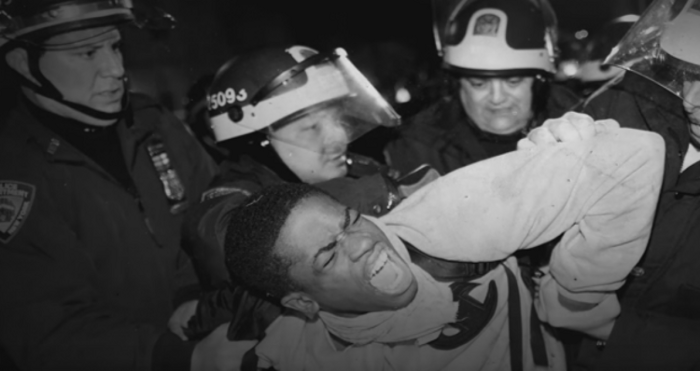
Genre: Documentary
Rating: TV-MA
Streaming: Netflix
Premise: An in-depth look at the prison system in the United States and how it reveals the nation’s history of racial inequality.
13th focuses primarily on the prison system in the United States. It explores how the implementation of the 13th Amendment, which abolished slavery, provided a loophole for the police to arrest Black people in mass. This documentary gives great insight into the political weaponization of The War on Drugs (something I discuss further in my review for Have a Good Trip). Looking at how Presidents Nixon, Regan, Clinton, and Bush used wars on drugs and crime as a means to disproportionately lock up Black people is as much eye-opening as it is disturbing.
Ava DuVernay does a fantastic job directing this film, constructing a very clear narrative. She finds the right way to tell this story linearly while also jumping between other topics and aspects that stem from the larger issue. Every side element the film goes into ultimately leads back to the main point, which is the sign of a well-composed documentary.
For anyone who may not know about how the for-profit prison system in this country specifically targets Black people and locks them up for minor offenses, as well as the history of the prison system in being a new form of slavery, 13th is a film that needs to be watched.

7 | BlacKkKlansman (2018)| Directed by Spike Lee

Starring: John David Washington, Adam Driver, Laura Harrier
Genre: Drama, Comedy
Rating: R
Streaming: HBO Max, HBO Go
Premise: Ron Stallworth, an African American police officer from Colorado Springs, CO, successfully manages to infiltrate the local Ku Klux Klan branch with the help of a Jewish surrogate who eventually becomes its leader. Based on actual events.
Spike Lee finally won his Oscar for “Best Adapted Screenplay” with BlacKkKlansman, which is a fantastic movie. It looks at integration within the Colorado Springs Police Department, as Ron Stallworth (John David Washington) becomes the first person of color to join the force. While his main mission is to infiltrate the Klu Klux Klan, Ron is put at a moral crossroads when Patrice (Laura Harrier) finds out he’s a cop. Ron says he wants to fight from within the system, to which Patrice says that the system is too corrupt to be changed; it needs to be overthrown.
While police brutality isn’t so much a focus of the film, it gives a good window into the hostility within the department when Ron first joins. There is a powerful scene where Ron is talking with a couple of other cops about this one officer who pulled Patrice over and threatened her life while sexually harassing her. The cops say that this officer killed a Black kid a few years back, and everyone knew he was bad. Ron asks why nobody has done anything about it, and the cops say that for good or bad they’re all a family, and you don’t turn your back on family.
Containing all of the levity and style you’d expect from a Spike Lee joint, BlacKkKlansman ties everything back into the present day with footage from the Charlottesville Unite the Right rally in 2017. This led to plain-clothed Nazis marching through the streets, inciting violence, and resulting in the death of Heather Heyer, to whom the film is dedicated.

While this is a time to listen and learn, it’s also a time to act. Research different resources to help educate yourself and others. Attend protests and rallies to continue to spread awareness. Sign as many petitions as you can. Lobby your elected officials to take action and to change the law. If you are financially able, donate to different organizations and nonprofits that are on the ground helping people and mobilizing activists.
Here are some Minnesota-based organizations to support. These are all based in the same area where George Floyd was murdered, and they could use all the help they can get to make sure that this never happens again. You can also research other local organizations in your area that are helping to fight for Black lives.
Minnesota Freedom Fund raises money to pay criminal bails and immigration bonds for those who cannot afford to as they seek to end discriminatory, coercive, and oppressive jailing.
Reclaim the Block organizes Minneapolis community and city council members to move money from the police department into other areas of the city’s budget that truly promote community health and safety.
Avenues for Youth supports youth ages 16–24 in Hennepin County, Minnesota. Whether a young person needs someplace to stay for just one night, or a year and a half, Avenues empowers youth to find their path out of homelessness; they do this by providing a stable home, building trusting relationships, and navigating the youth’s education, career, health, and wellness and housing goals.
Black Visions Collective centers their work in healing and transformative justice principles, intentionally develop their organization’s core “DNA” to ensure sustainability, and develop Minnesota’s emerging Black leadership to lead powerful campaigns.
Author: Nathanael Molnar, originally published [6/11/2020]
More to explore
By Same Author
Related lists created by the same author





